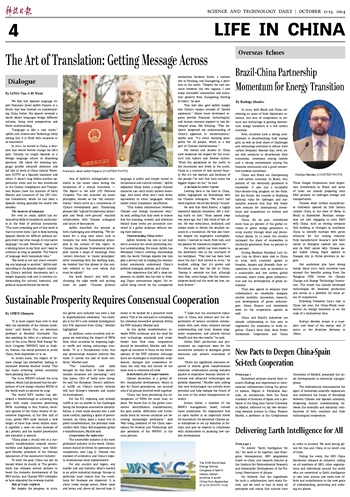
 |
| Rodrigo Mendes. (COURTESY PHOTO) |
In 2024, with Brazil and China celebrating 50 years of their diplomatic relations, one area of cooperation in science and technology is gaining momentum: energy transition to a low carbon economy.
Both countries have a strong commitment to decarbonizing their energy grid, as well as their share of challenges and technology solutions to reduce their carbon footprint. Beyond that, both enjoy tech solutions to decarbonize their economies, consensus among leaders and a strong commitment among the business community and a good connection between academies.
China and Brazil are championing a low-carbon economy. In Brazil, 89.2 percent of the electricity generated is renewable. It also has a successful four-decade-long program on bio-fuels. For the future, the country is finalizing national rules for hydrogen and sustainable aviation fuel that will foster new avenues for international investment and cooperation on science and technology.
China, for its part, contributed more than 50 percent of the global increase in green energy generation in 2023, mainly through wind and photovoltaic plants. In 10 years, the country increased the share of renewables in electricity generation from 24 percent to 39 percent.
During Brazilian President Luiz Inacio Lula da Silva's state visit to China in 2023, both countries agreed to broaden, deepen and diversify their cooperation in areas such as transition to a sustainable and low carbon global economy; smart cities; green infrastructure and the development of green industries.
They also agreed to enhance their collaboration on renewable energies; electric mobility; innovation, research, and development of green technologies. Green finance and investment were on the cooperation agenda as well.
China and Brazil's industries are already collaborating in this area to implement the consensus to work together. China's State Grid, State Power Investment Corporation and China Three Gorges Corporation have important investments in Brazil and some of them are already preparing joint R&D projects on hydrogen storage and transportation.
Chinese wind turbine manufacturer Goldwind opened its first factory outside China in the state of Bahia in Brazil in September. Brazilian companies are also engaging in joint R&D with China, such as mining company Vale working in Chengdu in southwest China to identify startups with green solutions for the mining industry. Pulp manufacturer Suzano's new R&D center in Shanghai opened last year, and its R&D center with Chinese paper maker Libang Paper opened in Xiaogan city in Hubei province in August.
Our academies also have strong bonds. Since 2010, both countries have enjoyed the benefits arising from the Tsinghua-UFRJ Center for Climate Change and Energy Technology Innovation. The center has already developed technologies for biodiesel production and serves as a platform for other areas of cooperation.
Following President Lula's visit to China last year, the China-Brazil cooperation on energy transition is on the cusp of a momentous time.
Rodrigo Mendes Araujo is a counselor and head of the energy and IP sector at the Brazilian Embassy in China.







